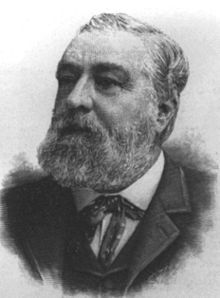James Biddle Eustis
| James Biddle Eustis | |
|---|---|
 |
|
|
United States Senator from Louisiana |
|
|
In office January 12, 1876 – March 4, 1879 |
|
| Preceded by | William P. Kellogg |
| Succeeded by | Benjamin F. Jonas |
|
In office March 4, 1885 – March 4, 1891 |
|
| Preceded by | Benjamin F. Jonas |
| Succeeded by | Edward D. White |
| United States Ambassador to France | |
|
In office 1893–1897 |
|
| President | Grover Cleveland |
| Preceded by | T. Jefferson Coolidge |
| Succeeded by | Horace Porter |
| Member of the Louisiana Senate | |
|
In office 1874-1878 |
|
| Member of the Louisiana House of Representatives | |
|
In office 1872 |
|
| Personal details | |
| Born |
August 27, 1834 New Orleans, Louisiana |
| Died | September 9, 1899 (aged 65) Newport, Rhode Island |
| Political party | Democratic |
James Biddle Eustis (August 27, 1834 – September 9, 1899) was a United States Senator from Louisiana.
Born in New Orleans, he was the son of George Eustis (1796–1858) and Clarice Allain. His father was a lawyer who served as a Chief Justice of the Louisiana Supreme Court. James pursued classical studies, graduated from the Harvard Law School in 1854, was admitted to the bar in 1856 and commenced practice in New Orleans. He served as judge advocate during the Civil War in the Confederate Army and resumed the practice of law in New Orleans.
He was elected a member of the Louisiana House of Representatives prior to the Reconstruction acts, and was one of the committee sent to Washington, D.C. to confer with President Andrew Johnson on Louisiana affairs. He was again a member of the State house of representatives in 1872, and was a member of the Louisiana Senate from 1874 to 1878.
Eustis was elected as a Democrat to the U.S. Senate to fill the vacancy in the term commencing March 4, 1873, caused by the action of the Senate in declining to seat rival claimants William L. McMillen and P. B. S. Pinchback. Eustis served from January 12, 1876 to March 4, 1879; he was an unsuccessful candidate for reelection, and was professor of civil law at the Tulane University Law School from 1877 to 1884, then called the University of Louisiana. He was again elected to the U.S. Senate and served from March 4, 1885 to March 4, 1891; he was not a candidate for reelection, and practiced law in Washington, D.C., in 1891.
...
Wikipedia
